“I Want to Do More Than Just Drive the Plot Forward”: Chloe Domont, Andrew Haigh, Cord Jefferson, Tony McNamara, Eric Roth and Celine Song on the THR Writer Roundtable
- Oops!Something went wrong.Please try again later.
- Oops!Something went wrong.Please try again later.
- Oops!Something went wrong.Please try again later.
- Oops!Something went wrong.Please try again later.
- Oops!Something went wrong.Please try again later.
- Oops!Something went wrong.Please try again later.
- Oops!Something went wrong.Please try again later.
- Oops!Something went wrong.Please try again later.
- Oops!Something went wrong.Please try again later.

What part of writing do writers actually enjoy? The answers from the six panelists on the 2023 THR Writer Roundtable — Fair Play’s Chloe Domont, All of Us Strangers’ Andrew Haigh, American Fiction’s Cord Jefferson, Poor Things’ Tony McNamara, Killers of the Flower Moon’s Eric Roth and Past Lives’ Celine Song — run the gamut from “everything” to “none of it.”
The answer to that question is not the only thing that differentiates the participants. Three were born in America, while one hails from South Korea (Song), another from Australia (McNamara) and still another from England (Haigh). One has been writing screenplays for more than a half-century (Roth), while three had never written a script that was turned into a film (Domont, Jefferson and Song). Two of their 2023 films were original (Domont and Song), while four were adapted from books (Haigh, Jefferson, McNamara and Roth). And two handed their scripts to others to direct (McNamara and Roth), while the other four did not.
More from The Hollywood Reporter
Glen Powell Proposes Richard Linklater Direct His Pitched Body Swap Movie With Justin Hartley
Dylan O'Brien Details How His Viral 'Ponyboi' Transformation Came to Be
But, as was evident during a mid-November conversation at THR’s Los Angeles offices, they have at least one thing in common: a gift for writing, which enabled them to pen six of the year’s most outstanding screenplays and to share in this conversation valuable insights about the challenges and rewards of writing for film in 2023.
Chloe, you’ve been climbing the ranks in TV for the past few years, writing on shows like Ballers and directing on shows like Billions. My understanding is that things were going on in your life at the same time that motivated you to write Fair Play, your first produced feature-length screenplay.
CHLOE DOMONT It was this feeling that my success didn’t feel like a total win — it felt like a loss, at some level — because of the relationships I was in. These were relationships with men who, on the one hand, adored me for my strengths and ambition. But there was also this unspoken tension that me being “big” on some level made them feel “small,” and it just made me realize how much hold these ingrained power dynamics still have over us today. So that’s something that I wanted to sink my teeth into.
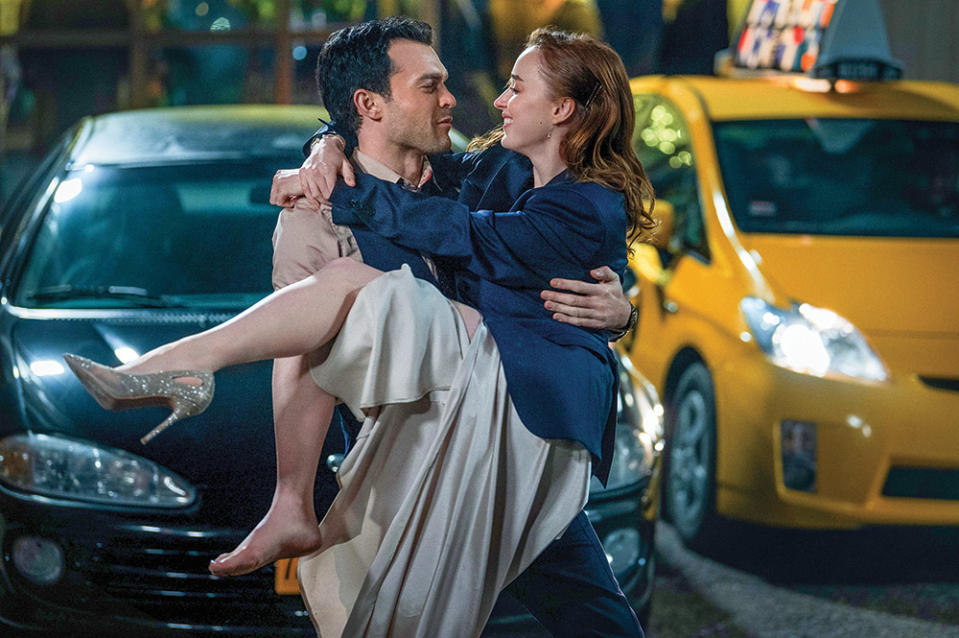
Andrew, you’ve written and directed several beautiful films, among them Weekend and 45 Years. But if I’m not mistaken, you’ve previously brought material to others and said, “This is what I want to do.” All of Us Strangers started differently, right?
ANDREW HAIGH Someone sent me the novel [1987’s Strangers, by Taichi Yamada]. It’s a traditional ghost story, in the Japanese sense, but the central idea — meeting your parents again long after they’ve gone — got me, even though my parents are still alive. There’s something about that reunion with the past, and how it can make you remember and relive painful experiences, and how reliving can help you move on and perhaps find some liberation.
Cord, you were a journalist and then began writing for TV, moving between comedies like Master of None and The Good Place and dramas like Succession and Watchmen. What led you to the book from which you adapted American Fiction?
CORD JEFFERSON I had a horrible 2020. Besides the COVID thing, I had a big professional failing: I came very close to getting a TV show on the air, and at the last minute it was killed. I was adrift, trying to figure out what my next project would be and just by chance read a review for a novel called Interior Chinatown that said it was a satire reminiscent of Percival Everett’s Erasure. So I went and read a synopsis of Erasure; it sounded interesting, so I bought it. Reading it, I had the feeling that it was written specifically for me. Twenty pages into it, I was like, “I might want to adapt this.” Fifty pages into it, I thought, “Maybe I want to direct this.” Then I started reading the novel in Jeffrey Wright’s voice. The themes — what it means to be a writer of color, and the restrictions people put on your life and the stories you can tell because of your identity — that was stuff I’d thought about since I was a journalist. It just resonated with me deeper than any piece of art before or since.
Tony, you wrote another film that Yorgos Lanthimos directed, 2018’s The Favourite. Then you created and wrote nearly every episode of the TV series The Great. How, then, did you end up reuniting with Yorgos for Poor Things?
TONY MCNAMARA Before we went into production on The Favourite, he told me about Alasdair Gray’s [1992 novel] Poor Things. He really loved it, but he couldn’t get anyone to give him money for someone to write it. I read it, and it was such a wild story — when I first read it, I was like, “What? They take the baby’s brain out and put it in her head? But it’s a comedy?” The book told the whole story from the men’s perspective; Bella’s story is never told by her until the last two pages. But Bella was the character Yorgos wanted to center, and that was the key to the movie for me. I was like, “This is a movie about control — how you enter the world and everyone wants to control your ideas, your upbringing, how you see the world, your body.” So I said yes.
Eric, you’ve been writing scripts for nearly 60 years, among them Forrest Gump, The Insider, Munich, The Curious Case of Benjamin Button, A Star Is Born, Mank and Dune — and those are just your scripts that were nominated for Oscars! How did you and Martin Scorsese connect for and decide to co-adapt Killers of Flower Moon?
ERIC ROTH I read the book, and it showed the lack of education I had. It reminded me of the Tulsa race massacre, which I knew nothing about. I’d never seen something that was as heinous as this. I became very passionate about it. Marty and I set out to make a gigantic, John Ford-like Western, and it slowly became something else. Marty said, “I don’t want to do a whodunit because we all did it.” Leonardo DiCaprio decided he did not want to play [the FBI agent; he and Scorsese wanted to shift the focus to the Osage people]. So I started over.
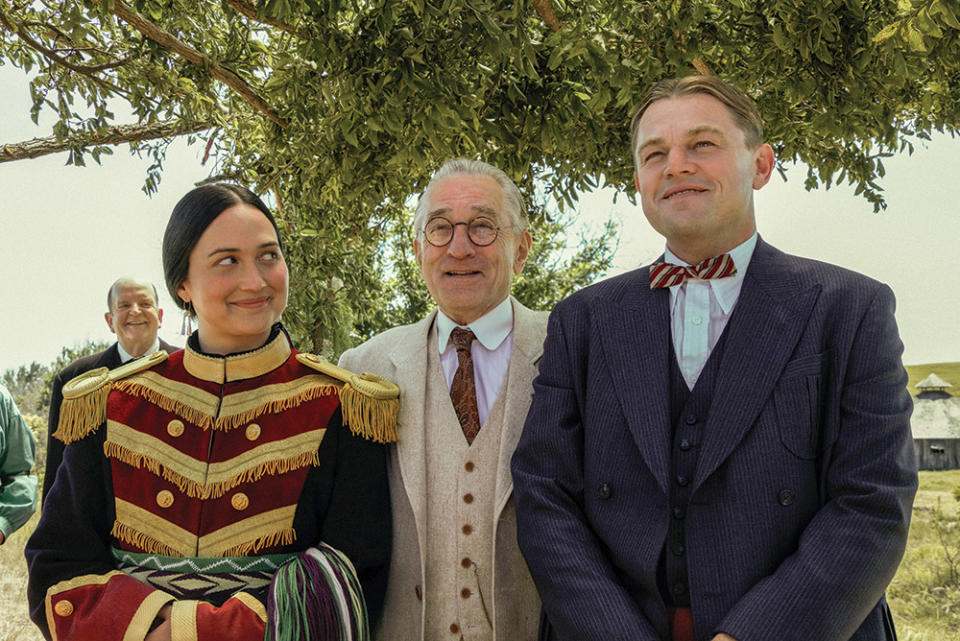
Celine, you spent the past decade as an acclaimed playwright. How did you decide to move into film with the personal story that’s at the center of Past Lives?
CELINE SONG I was sitting in a bar in New York City between my childhood sweetheart who had come to visit me from Korea — he’s now a friend — and my husband, whom I love and live with in New York City. Because they do not speak each other’s language, and I do, I was translating between these two people who both cared for me and knew me very differently. In that moment, I was becoming a bridge or a portal between not just two people and cultures and languages, but parts of my own self and history. I felt really big. And that strange feeling stayed with me for a long time until I decided that it was something that I wanted to write about.
Celine and Chloe, your lives inspired your screenplays. I’d like to ask the other four of you, who adapted preexisting material, if something that isn’t autobiographical has to feel personal to you for you to want or be able to adapt it.
ROTH I don’t think you can go past word one without having passion for it, so you have to find something that’s important to you. With Killers of the Flower Moon, I just thought that this was a story that needed to be told.
HAIGH Whether I’m adapting something or it’s an original screenplay, I need to be able to connect on a very deep level — personally connect with it.
MCNAMARA It’s not necessarily a literal “That’s me,” but I think I have to feel it. With Poor Things and the character God [a scientist played by Willem Dafoe], I know what it’s like to be a father who loves their child too much and doesn’t want them to go anywhere because you want to protect them. In the same way, I know I want to go out into the world.
JEFFERSON I worked on Succession. I don’t know any white billionaires. But I think the reason that Succession works, and the reason why people love it so much, is that while most people don’t know anything about being white billionaires, they know what it’s like to have a sibling rivalry; to want to impress your father, who’s never given you his entire heart and soul; to have sexual hang-ups; to have drug addiction problems — all the stuff that makes human beings human.
Chloe, Cord, Tony and Andrew, you came to films via writing for TV, Celine, you via writing for theater. What do you find to be the biggest differences between the mediums? And why was film the ideal medium for your 2023 project?
SONG Different stories are suited for different mediums. Part of why I wanted to make Past Lives as a movie is because I know what’s required in theater. The thing about theater is that its relationship to time and space is very different; in theater, time and space is figurative, it can be as small as a light change or the way an actor turns and looks at someone. In Past Lives, the villains of the story are time and space — 23 years and the Pacific Ocean — so those things needed to be depicted literally.
MCNAMARA With TV, you’ve got 10 hours and can make more mistakes and get away with them. But with a screenplay, you’ve got to find the heart and the simplicity of it that’ll give you the complexity. That’s a beautiful challenge. The thing I love about film is the collaboration with the director. When I write for Yorgos, I’m like, “I wonder what he’ll do?” He’s going to bring something that’s not me, and I think that’s interesting. If you’re a writer working with a good director, they make you a better writer.
DOMONT When I was working in television, I was serving other people’s visions. My movie was my baby. Television was kind of like boot camp for me, gearing up toward making my first feature. It taught me to think fast because you don’t have time — not that you have much time in independent films either. You get to try out things on someone else’s dime. And it’s not necessarily something that’s your baby, so you’re not as precious about it.
JEFFERSON One of the reasons why I like making and watching TV is that time allows you to be discursive and digressive and go to weird places and spend time with characters in a nuanced and complex way. There are some characters in my movie that aren’t driving the plot forward, and I got some notes from people that were like, “You could get from A to B faster if you eliminate this.” And I thought, “There’s no way in hell that I would ever do that because I want to do more than just drive the plot forward.” I want to service these characters and make them feel like real, lived-in human beings.
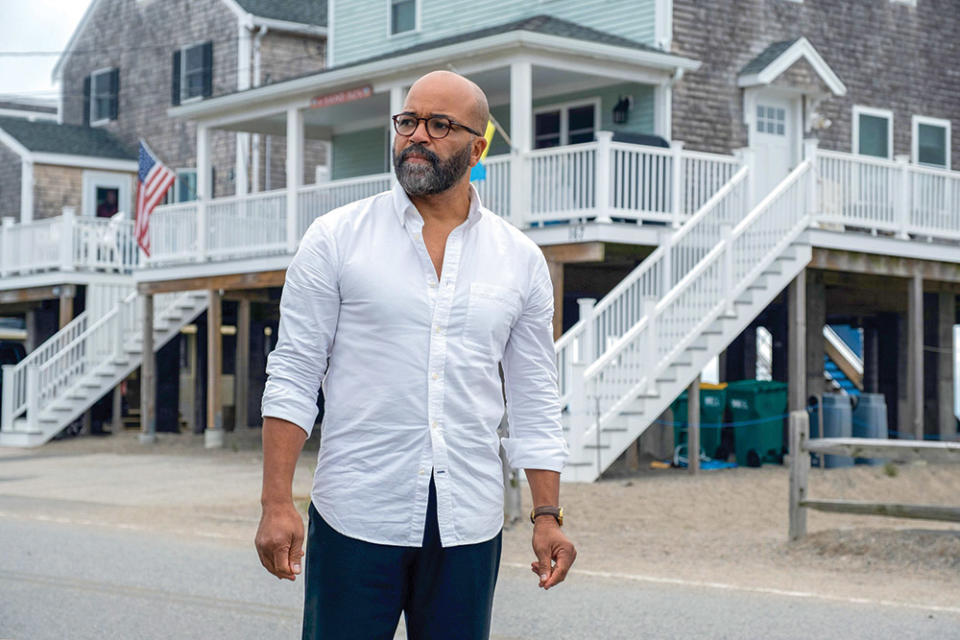
HAIGH The thing that I struggle with, with TV, is you never know if your show’s going to be canceled, which they often are. Mine [Looking] was. I don’t know how you can tell a story unless you know what the ending is. There are also different demands — like, you know that the audience is sitting there and they’re on their phone. Maybe they’re doing that when they’re watching films, too, let’s face it. But at home, the washing machine’s going off, stuff’s happening, the doorbell’s ringing, so you have to constantly keep their attention. And I quite like not to keep people’s attention sometimes. I want them to drift off a little bit and sort of sink into the story. In TV, you can’t do that.
MCNAMARA It’s hard because in TV you have to write endings that aren’t actual endings. Especially toward the end of a season, you’ve got to come up with some great ending, but it isn’t really an ending because you want another season. So you’re not quite serving the characters.
ROTH I’ve done it the other way — going from movies to television. I found it a little too analytical, to be honest with you. Some television is getting better, like Succession. I’m very close with David Milch, so I got to work on Deadwood, and he gave you permission to try things. You could do a one-off and just have characters really have some intimacy.
JEFFERSON I didn’t know you wrote on Deadwood, man — you’re even more of a legend. Jesus, that’s unbelievable!
ROTH Well, David’s the Shakespeare of television to me. He’s the one who said, “We don’t just have to tell story here. We can do some character.”
The way a film begins and ends is so important, isn’t it?
JEFFERSON A satisfying ending can make up for a lot of mistakes that come before it. When I was adapting Erasure, I knew I was going to have to make some pretty big changes in order to make it cinematic and a little less cynical than the book, but I always wanted to maintain the essence and spirit of what Percival wrote. I frequently write with no idea what the ending’s going to be. This was one of those instances, and I wrote an ending that I was not happy with, that I knew was going to have to change at some point. About a month out from preproduction, I was on a long drive and I had to talk about the ending with one of the producers. He called and said, “Try to write an ending that feels like a big swing, that feels as audacious as the rest of the film.” So I slept on it and then woke up and wrote the ending pretty quickly, in about 15 minutes. It’s a big departure from the ending of the book.
HAIGH For me, it’s about a question and then an answer. You’re answering something that you’ve set up. I have to know what that answer is. I don’t need to know what it is on a plot level, and with this, I sort of had no idea — but I knew how I wanted it to feel. I don’t always know how the plot is going to help reveal the things that I’m trying to talk about, but I know where I want to end.
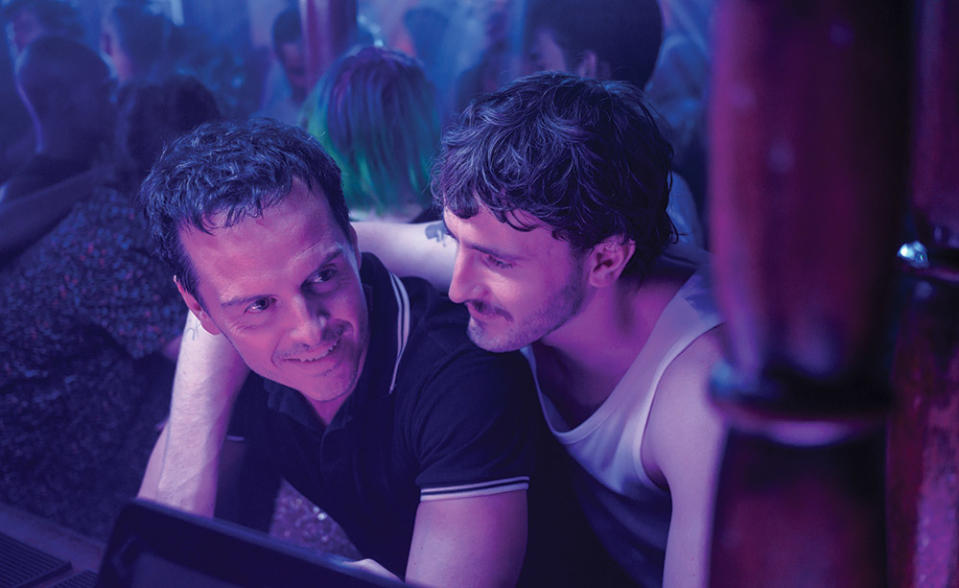
What’s the scene in your film that you’re asked about most?
HAIGH There’s a scene where Adam talks to his dad about how he felt growing up gay in the ’80s. To me, that was an essential scene. It’s a film about the pain that we keep inside that stays in us even though life changes when we get older. I’m 50 now, but I can be dragged back to how I felt when I was 13 or 14 in an instant. So that scene with the son and the father where he gets to talk to the father and ask, “Why weren’t you there for me? Why didn’t you understand? Why didn’t you come into my room when I was crying?” And for the dad to answer in an honest way? That was really fascinating for me. I wanted to be compassionate to parents and children in the situation, especially in relationship to queerness. It was certainly emotional for me to make. As I say, my dad is still alive, but he’s got dementia now, so I’ll never get to have those conversations.
MCNAMARA There’s a scene when Bella first takes a job at the brothel, and because of her nature, her immediate response is to change the way the whole brothel works: “Why don’t we pick the men?” It was a pivotal scene for us.
SONG The scene that everybody who’s seen the movie talks about is the final scene where Nora walks with her childhood sweetheart to a spot to get him picked up. Then the Uber comes and her friend gets in the car and leaves, and then she turns around and walks home crying. In the script, there was a description about what kind of a cry it is and things like that, but none of that was unlocked until we found the street that this walk was going to happen on. Then my DP asked me, “Which direction should Nora and Hae Sung walk to the Uber?” And my answer was so clear. That street looked like a timeline, so of course Nora and Hae Sung should walk into the past. So you have to have it from right to left, then wait there for two minutes, then when the Uber comes it’s going to drive into the past, and then of course Nora would turn around and start walking toward her present and future.
ROTH I think the fire in the movie is really important. Marty kept telling me, “Any time we have anybody look out the window, I want them seeing people who would walk over dead people and not care about it.” That fire scene was kind of a metaphor for that.
DOMONT The most talked-about scene in my film is the opening sex scene. It was also the trickiest scene. I rewrote that scene more than any other because I was looking for a shocking way to grab the audience and also to get you to fall in love with these characters, because it kind of turns pretty quickly. I knew that they had to get engaged, so it was like, “How can I show a fun engagement proposal that’s absurd and messy?” And I was like, “He has to propose to her with [menstrual] blood on his face.” It’s something that some audiences are shocked by, but for most people it makes you fall in love with him. It sets up the audience to think, “This is a man who’s, on some level, not threatened by a woman.”
JEFFERSON There’s a scene toward the end of the film in which Monk encounters Sinatra and they have a conversation about Black art and their ideology when it comes to making art. The reason I really like it, and I think the reason other people have responded to it, is because it depends on the day that I watch it whose side I fall on. I wrote the damn thing, and I don’t know who I agree with more!

Where do you tend to write?
JEFFERSON Bed.
MCNAMARA Cafes.
ROTH Home office.
SONG Wherever I can.
DOMONT Living room, and sometimes on the floor, actually, to ground myself and get my head out of my ass.
HAIGH Front room in the morning, cafe in the afternoon.
On what do you write?
ROTH I have a DOS [a vintage disk operating system] at home. (Everyone else gasps.) I only have like 38 pages of memory on it and that’s it, so it makes you finish the act. I print it out, and that’s it. It can’t go on the internet.
JEFFERSON Do you have to courier service your pages to people when they want to read it?
ROTH If I have an assistant, the assistant — or the production company — has to retype it into Final Draft.
JEFFERSON I literally sit in bed and type in Final Draft, a bit like Grandpa Joe in Willy Wonka.
MCNAMARA I do a lot of notes on a book this big (gestures arms far apart) — it’s just blank pages, and it’s like a mini whiteboard — that I carry around with me. And then I do it on yellow legal pad. And then I type it up.
HAIGH For me, lots of paper to start with. Bits of scenes, ideas, that kind of thing.
DOMONT Coffee-stained yellow pad to start with and then laptop.
SONG Everybody’s so romantic, with paper and DOS! For me, it usually starts in my Notes app on the phone. And then I usually write on Final Draft, but this particular script had to be written bilingually because this whole script is bilingual, and I wanted it to be written in English with the Korean parts written in Korean as well, but Final Draft doesn’t support Korean language, so I ended up using WriterDuet because they do support it. There is a kind of implicit systematic feeling that the whole industry — because Final Draft is an industry-leading platform — doesn’t want something that’s bilingual. There’s a kind of implicit messaging that I felt where they were saying, “We don’t want your script.”
Favorite part of the writing process?
ROTH Everything. I’ve said this many times, if I start to get a writer’s block, I change the weather.
HAIGH I would say that spark of an idea at the beginning, which is like, “Oh, this could be really good.” And then you start writing and you’re like, “Oh, I’m a terrible writer.” That’s when it gets hard.
DOMONT I would say the first draft, when I’m just writing and flowing. I spend a lot of time on the outline before I get to the first draft, so with the first draft I get to fly because I feel like I’ve done all the work. So the first draft is nothing but joy, and the second draft is nothing but pain.
SONG I was going to say none of it, but that’s not fully true. I like when I crack something that’s been annoying me. There will be moments of breakthrough where you’re like, “Oh! It should be set in a different place!” Sometimes it’s not even a huge thing. And then I usually do a little dance.
JEFFERSON There’s a quote that I love: “I hate writing, but I love having written.” Every time I sit down and write, I’m like, “This is a miserable experience. What a life I’ve made for myself. Why am I doing this? What do I think I’m trying to accomplish here?” And then as soon as I’m done, I’m like, “Oh, that was the best thing ever.” I heard once that women have a hormone when they’re giving birth that allows them to forget the pain so they’re willing to go through it again, and I feel like that’s probably the same hormone that’s being released when I’m writing.
MCNAMARA I’m everything, as well. I just like it. I like doing it. It’s my favorite part.
HAIGH See, these two [Roth and McNamara] are proper writers! We’re writer-directors, and they’re proper writers.
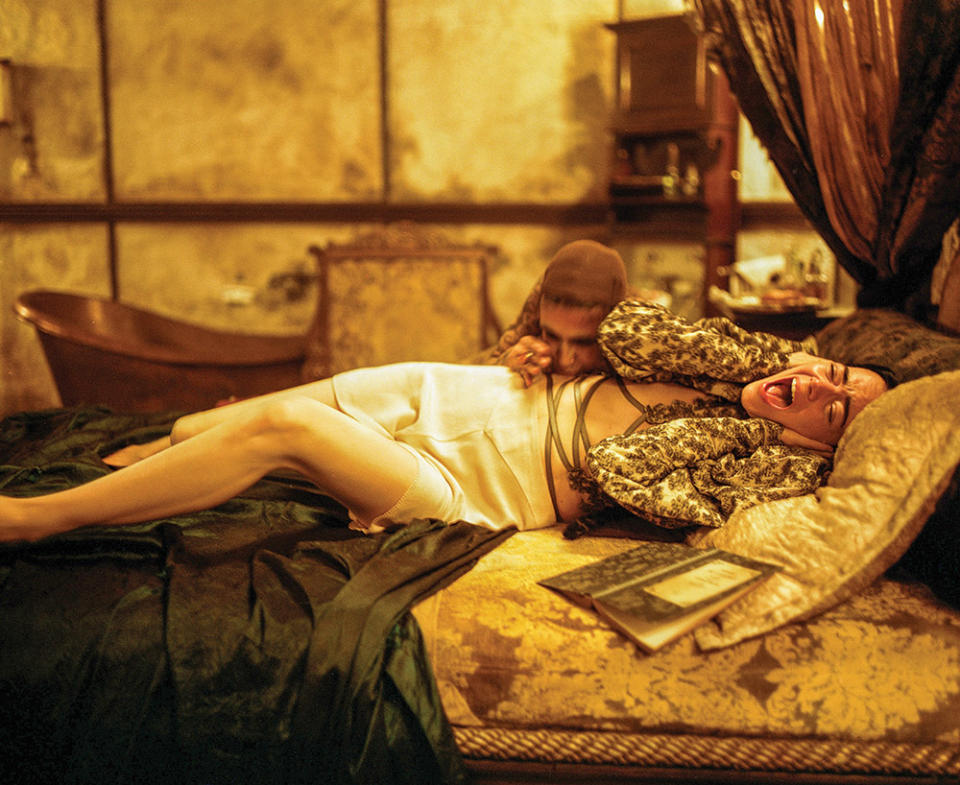
Finally, if you could have written one other script that became a film at any time in history, which would you most like to have written?
SONG You’ve Got Mail.
MCNAMARA Harold and Maude.
HAIGH Some Like It Hot.
ROTH 2001: A Space Odyssey.
JEFFERSON Network.
DOMONT I was going to say that, man!
JEFFERSON Sorry!
DOMONT Eyes Wide Shut, because it has the best last line of a movie ever. [Nicole Kidman’s character says, “There is something very important that we need to do as soon as possible.” Tom Cruise responds, “What’s that?” Kidman answers, “Fuck.”]
This story first appeared in the Dec. 7 issue of The Hollywood Reporter magazine. Click here to subscribe.
Best of The Hollywood Reporter

